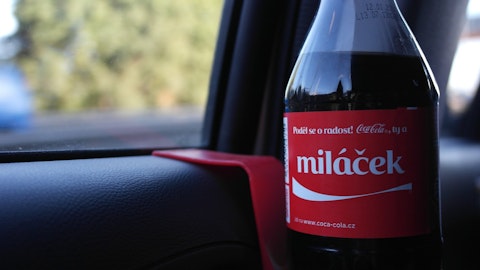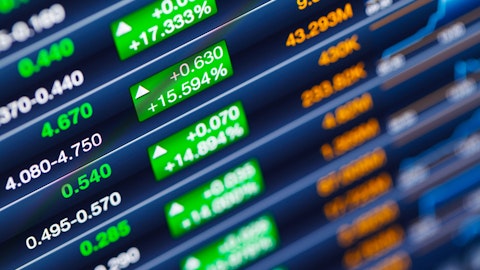In this article, we discuss the 12 best low volatility stocks to buy now. If you want to see more stocks in this selection, check out the 5 Best Low Volatility Stocks to Buy Now.
In the first half of 2023, global economic growth picked up pace, reaching 2.8%. Up to this point, the impact of monetary tightening was balanced by the diminishing supply shocks resulting from the COVID-19 pandemic and Russia’s invasion of Ukraine. However, since 2022, the surge in global policy rates by approximately 400 basis points (bps) has begun to affect interest-sensitive spending and impede factory output. Despite the current momentum, the fading resiliency of the global economy suggests that growth moderation is likely unavoidable. Speaking of the United States specifically, J.P. Morgan Research expects the country to undergo a mild recession towards the end of 2023. This prediction comes from the Federal Reserve’s adoption of a restrictive policy stance, which is expected to lead to tighter credit conditions, consequently dragging down the economy.
Dubravko Lakos-Bujas, Global Head of Equity Macro Strategy at J.P. Morgan., stated:
“Given that multiple expansion has been the main driver of performance year to date, we see unattractive risk-reward for equities and increasing investor complacency ahead of our expectation that the business cycle will further decelerate in the second half of the year, with the onset of a recession likely in the fourth quarter of 2023 or first quarter of 2024. What’s more, consumers are starting to show signs of weakness, and there is a risk that liquidity and credit conditions could tighten in the coming months.”
According to economists at Goldman Sachs, the likelihood of a recession in the next 12 months has decreased to 25% from their previous projection of 35%, which was made shortly after the failure of Silicon Valley Bank in March. Additionally, Goldman Sachs Research projects a robust annual average growth of 1.8% for this year, surpassing the consensus among private-sector economists and the projections made by the Federal Reserve.
In the realm of investing, volatility holds significant importance. It becomes evident to investors during market downturns when certain individual stocks, characterized by higher volatility, undergo substantial price fluctuations. Additionally, it serves as a proxy for risk; higher volatility often implies a riskier portfolio. As an example, certain sectors such as healthcare, consumer staples, telecommunications, and utilities are known for being less volatile than others, making them potentially safer investment options during times of recession. Business Insider’s report indicated that the consumer staples industry had outperformed the overall market by an impressive 49% over a 25-year period ending in 2015, with much of this outperformance observed during recessionary periods. Similarly, the Dow Jones Utility Average experienced only a marginal decline of 1.4% in 2022, while the S&P 500 faced a substantial 19.4% decrease during the same period.
See also: 10 Best Recession-Proof Stocks to Buy Now
As the first half of this year came to a close, the market received a positive boost from a reassuring inflation report. This has led some to question the need for acquiring the safer holdings as the overall market sentiment remains strong and supported by seemingly justifiable factors. Although investors may be inclined to favor riskier securities with higher potential returns in such a market environment, it is important to realize that the market can shift and turn at any moment. In that regard, low volatility stocks serve as safe harbors for investors who are averse to turbulent market swings. Their comparatively steady performance not only aids in minimizing losses during downturns but also prevents hasty panic selling that could jeopardize one’s retirement savings. With these details in mind, let’s take a look at some low volatility stocks, out of which the top picks include the likes of Merck & Co., Inc. (NYSE:MRK), Johnson & Johnson (NYSE:JNJ), and Berkshire Hathaway Inc. (NYSE:BRK-A), among others listed below.

Image by Sergei Tokmakov Terms.Law from Pixabay
Our Methodology
We selected the following low risk stocks suitable based on optimistic analyst coverage, strong business fundamentals, and resilient dividend profiles. The betas for these firms were below 1.0 as of July 19, which means these stocks are less risky as compared to the broader market. We have assessed the hedge fund sentiment from Insider Monkey’s database of 943 elite hedge funds tracked as of the end of the first quarter of 2023.
12. Altria Group, Inc. (NYSE:MO)
Number of Hedge Fund Holders: 49
Beta Value: 0.62
Altria Group, Inc. (NYSE:MO) is a prominent American corporation renowned as one of the largest producers and marketers of tobacco, cigarettes, and related products worldwide. Its global operations are based in Henrico County, Virginia. With an impressive 54-year streak of dividend increases, few companies are as experienced as Altria Group, Inc. (NYSE: MO) in effectively navigating market downturns.
According to Insider Monkey’s data, 49 hedge funds were long Altria Group, Inc. (NYSE:MO) at the end of the first quarter of 2023, compared to 45 funds in the last quarter. Natixis Global Asset Management’s Harris Associates held the largest stake in the company, with 6.33 million shares worth $282.77 million.
Much like Merck & Co., Inc. (NYSE:MRK), Johnson & Johnson (NYSE:JNJ), and Berkshire Hathaway Inc. (NYSE:BRK-A), Altria Group, Inc. (NYSE:MO) is a smart low volatility stock that investors should take note of.
11. Verizon Communications Inc. (NYSE:VZ)
Number of Hedge Fund Holders: 59
Beta Value: 0.35
Verizon Communications Inc. (NYSE:VZ), commonly known as Verizon, is an American multinational telecommunication conglomerate and a corporate component of the Dow Jones Industrial Average. In the first quarter of 2023, the telecommunications firm reported an increase of 633,000 subscribers.
On June 1, Verizon Communications Inc. (NYSE:VZ) declared a $0.6525 per share quarterly dividend, in line with previous. The dividend is distributable on August 1, to shareholders of record on July 10.
According to Insider Monkey’s first quarter database, 59 hedge funds were long Verizon Communications Inc. (NYSE:VZ), compared to 56 funds in the preceding quarter. Billionaire Cliff Asness’ AQR Capital Management is a prominent stakeholder of the company, with 4.8 million shares worth $188.5 million.
10. The Coca-Cola Company (NYSE:KO)
Number of Hedge Fund Holders: 61
Beta Value: 0.54
Established in 1892, The Coca-Cola Company (NYSE:KO) is a major American multinational corporation renowned for its production of the iconic Coca-Cola beverage. The company is a global leader in the beverage industry, and is involved in the manufacturing, sales, and marketing of a diverse array of non-alcoholic beverage concentrates, syrups, and even some alcoholic beverages.
On June 6, HSBC analyst Carlos Laboy lowered the price target on The Coca-Cola Company (NYSE:KO) from $77 to $74 while maintaining a Buy rating on the shares. Although the analyst perceives KO as a stronger defensive stock during inflationary periods compared to its historical performance, he expresses near-term apprehension concerning the ongoing tax litigation.
According to Insider Monkey’s first quarter database, 61 hedge funds were bullish on The Coca-Cola Company (NYSE:KO), compared to 58 funds in the preceding quarter. Warren Buffett’s Berkshire Hathaway is the biggest stakeholder of the company, with 400 million shares worth $24.8 billion.
Rowan Street Capital mentioned The Coca-Cola Company (NYSE:KO) in its Q4 2022 investor letter. Here is what the firm has to say:
“Let’s take The Coca-Cola Company (NYSE:KO) for example. Its dividend yield is 2.8%, earnings are estimated to grow at only 3.6% rate per year over next 4 years, and its earnings multiple is currently at 24x (based on next year’s forecasted earnings). KO has an anemic growth, so we can argue that paying 24x earnings is not very attractive. Let’s assume that the multiple will stay constant over the next 3-5 years, thus our expected annual returns will be 2.8%+3.6% = 6.4% (that is below the current reported inflation rate and only slightly above the risk-free rate of 4%).”
9. McDonald’s Corporation (NYSE:MCD)
Number of Hedge Fund Holders: 64
Beta Value: 0.64
McDonald’s Corporation (NYSE:MCD) is an American multinational fast food chain, founded in 1940 as a restaurant operated by Richard and Maurice McDonald. McDonald’s Corporation (NYSE:MCD) has been growing its dividends consistently for the past 46 years. Currently, it offers a quarterly dividend of $1.52 per share and its dividend yield on July 19 stood at 2.07%.
On April 25, the company released its most recent fiscal quarter results, surpassing the consensus earnings forecast. The revenue exhibited a notable 4% year-over-year growth, exceeding the consensus revenue forecast by over $300 million, while the adjusted EPS expanded from $2.28 to $2.63.
At the end of Q1 2023, 64 hedge funds tracked by Insider Monkey reported having stakes in McDonald’s Corporation (NYSE:MCD), up from 57 in the previous quarter. These stakes are collectively worth over $4 billion. With over 1.64 million shares, Paul Marshall And Ian Wace’s Marshall Wace LLP was the company’s leading stakeholder.
8. Pfizer Inc. (NYSE:PFE)
Number of Hedge Fund Holders: 73
Beta Value: 0.35
Pfizer Inc. (NYSE:PFE) is an American multinational pharmaceutical and biotechnology corporation headquartered at The Spiral in Manhattan, New York City. Founded in 1849 by German entrepreneurs Charles Pfizer and Charles F. Erhart, the company is renowned developing and manufacturing medicines and vaccines spanning various fields, including immunology, oncology, cardiology, endocrinology, and neurology. Notably, in 2022, Pfizer’s top-performing product was the COVID-19 vaccine Comirnaty, which generated an impressive $37.8 billion in alliance revenues and direct sales.
The biotech company has been raising its dividends consistently for the past 13 years. It currently pays a quarterly dividend of $0.41 per share and has a dividend yield of 4.50%, as of July 19.
At the end of March 2023, 73 hedge funds tracked by Insider Monkey owned stakes in Pfizer Inc. (NYSE:PFE), worth collectively roughly $2.2 billion. Of these, Cliff Asness’ AQR Capital Management is the largest shareholder, with total stakes worth approximately $380.28 million.
7. AbbVie Inc. (NYSE:ABBV)
Number of Hedge Fund Holders: 75
Beta Value: 0.54
AbbVie Inc. (NYSE:ABBV) operates as a specialized biopharmaceutical company focused on the discovery, development, manufacturing, and commercialization of drugs designed to address chronic and complex diseases. The company is best known for manufacturing its blockbuster drug Humira — a medication used to treat moderate-to-severe rheumatoid arthritis and Crohn’s disease.
With a record of 50 years of continuous dividend growth, the American pharmaceutical company currently offers a quarterly dividend of $1.48 per share, with yield of 4.30% as of July 19.
As of the close of Q1 2023, 75 hedge funds in Insider Monkey’s database reported having stakes in AbbVie Inc. (NYSE:ABBV), compared with 73 in the previous quarter. Among these hedge funds, Citadel Investment Group was the company’s leading stakeholder in Q1.
Harding Loevner mentioned AbbVie Inc. (NYSE:ABBV) in its Q1 2023 investor letter. Here is what the firm has to say:
“One of our two new additions to the portfolio is AbbVie Inc. (NYSE:ABBV), a US drugmaker best known for Humira, a medicine used to treat a variety of autoimmune diseases. AbbVie is building upon its maturing blockbuster Humira business by expanding its stable of autoimmune-disorder treatments with launches such as Skyrizi and Rinvoq, which have been well received and should support continued growth. Separately, we believe the slowdown in venture capital funding may foster more collaboration between biotechnology companies with promising, early-stage pipelines and large pharmaceutical companies. This may allow AbbVie to supplement its own pipeline at cheaper valuations than biotechs had commanded in recent years.”
6. The Procter & Gamble Company (NYSE:PG)
Number of Hedge Fund Holders: 75
Beta Value: 0.41
The Procter & Gamble Company (NYSE:PG) is an American multinational consumer goods corporation headquartered in Cincinnati, Ohio, founded in 1837 by William Procter and James Gamble. The company provides branded consumer packaged goods worldwide, operating through Beauty, Grooming, Health Care, Fabric & Home Care, and Baby, Feminine & Family Care segments.
On June 11, The Procter & Gamble Company (NYSE:PG) declared a quarterly dividend of $0.9407 per share, which was in line with its previous dividend. The company has consistently raised its dividends for 67 years. During fiscal Q3 2023, The Procter & Gamble Company (NYSE: PG) recorded a 3.5% year-over-year growth in revenue, amounting to $20.07 billion. The company’s operating cash flow for the quarter reached approximately $4 billion, and its cash flow productivity was at an impressive 92%.
According to Insider Monkey’s first quarter database, 75 hedge funds were bullish on the Procter & Gamble Company (NYSE:PG), compared to 74 funds in the preceding quarter. Ray Dalio’s Bridgewater Associates is the largest stakeholder of the company, with 4.94 million shares valued at $735.2 million.
Rowan Street Capital made the following comment about The Procter & Gamble Company (NYSE:PG) in its Q4 2022 investor letter:
“Let’s look at The Procter & Gamble Company (NYSE:PG). Dividend yield is 2.4%. Earnings are forecasted to grow at 5.9%, and its current earnings multiple is at 25x. Now, let’s say over the next 3-5 years the market loses interest in the “safe”, mature companies that grow at anemic rates and gets an appetite for growth again. It’s very unlikely that Mr. Market will be paying 25x for 5.9% earnings growth. Let’s assume that multiple declines to the market average of 18x — that would be ~6.9% drag per year on the total expected return over next 3-5 years. If we get 2.4% (dividend) + 5.9% (earnings growth) – 6.9% (decrease in earnings multiple) = 1.4% (annual return we can expect on average from this stock).”
The Procter & Gamble Company (NYSE:PG), like Merck & Co., Inc. (NYSE:MRK), Johnson & Johnson (NYSE:JNJ), and Berkshire Hathaway Inc. (NYSE:BRK-A), is a low volatility stock that hedge funds are piling into.
Click to continue reading and see 5 Best Low Volatility Stocks to Buy Now.
Suggested articles:
- 12 Best Dividend Stocks Under $25
- 10 Best Artificial Intelligence Stocks Under $10
- 10 Best One Dollar Stocks to Buy Now
Disclosure. None. 12 Best Low Volatility Stocks to Buy Now is originally published on Insider Monkey.





